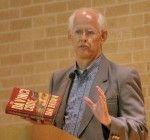Dan Brown’s novel, “The Da Vinci Code,” is nothing more than a collection of details woven skillfully into an interesting plot to garner profit and should not be taken as a religious history, said J. Lanier Burns in his speech, “A Religious Phenomenon: The Da Vinci Code” Thursday evening. Burns, a senior professor of systematic theology and research professor of theological studies at Dallas Theological Seminary, said Brown’s 2003 best seller expressed three major themes of anti-Catholicism, feminism and new age mysticism.
Burns said the book, which follows the adventures of a Harvard symbologist who uncovers a conspiracy by the Catholic Church to hide the marriage of Jesus Christ to Mary Magdalene, was bound to become a best seller because it was written in a controversial period in the Church’s history.
“Think of the date when he wrote the book – 2000 to 2003 – the pedophile era,” he said. “There are thousands of people who have built up questions in their minds and wonder what else could be wrong.”
Burns said the book attempts to restore the female spirituality and the divine feminine and entices readers with depictions of orgies and sexual religious rites.
“The phenomenal success of this book in the Western technological world would be quite impossible without overt sexuality of a book like this,” he said. “He is describing life as millions of people are living it out, saying sex is a natural, cherished route of spiritual fulfillment.”
Burns said he doesn’t understand the willingness of the public to accept the novel as the truth, because the book was intended as a fictional thriller. “A novel is fiction, and the author’s purpose in fiction is to make it plausible so you think he’s serious by assaulting you with details,” he said. “Why are people trying to learn history from fiction? I would recommend you take a good, stout history course and enjoy this as entertainment.”
Burns said that while many Christians are upset about the novel because they think Brown has misrepresented their religious history, they should realize Brown is in the business to sell books.
“Dan Brown takes the facts of early Christianity and puts them in a lottery machine, and out they pop in random order,” he said. “The Catholic community who doesn’t take the genre of the novel into account is deeply offended in the changing of their history by being told that everything in between Constantine and Christ was sacred feminine, where everyone is cohabiting.”
Burns said religious scholars have easily recognized factual errors, such as the role of Pope Constantine in commissioning a new Bible and the significance of the Dead Sea Scrolls, and that Brown purposely made these errors to trick readers.
“Dan Brown is by genre a thriller novel writer, and he is a trickster,” he said. “(The errors) are so obvious, you can tell Brown is having fun with his readers – and he’s laughing all the way to the bank.”
Matt Whinery, a senior economics major, said although he has not read the novel, he found the presentation informative.
“I think it’s important that people can understand that it’s fiction, not fact, written for enjoyment rather than education,” Whinery said.
Steven Potter, a senior industrial distribution major, said the speech enhanced his reading of the novel and that he enjoyed the presentation for discussing different perspectives and literary elements.
“There seem to be some pretty gaping holes, but he made it clear that it was a novel not intended to be taken as fact,” he said.
Da Vinci Code’ is for entertainment
April 28, 2005

0
Donate to The Battalion
Your donation will support the student journalists of Texas A&M University - College Station. Your contribution will allow us to purchase equipment and cover our annual website hosting costs.
More to Discover








